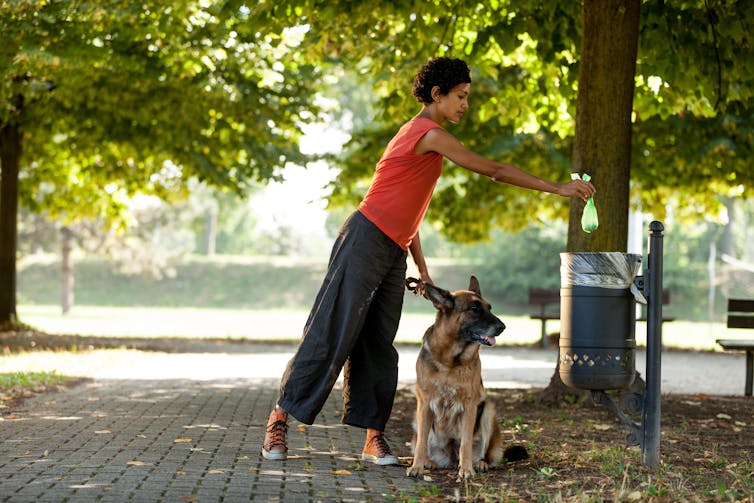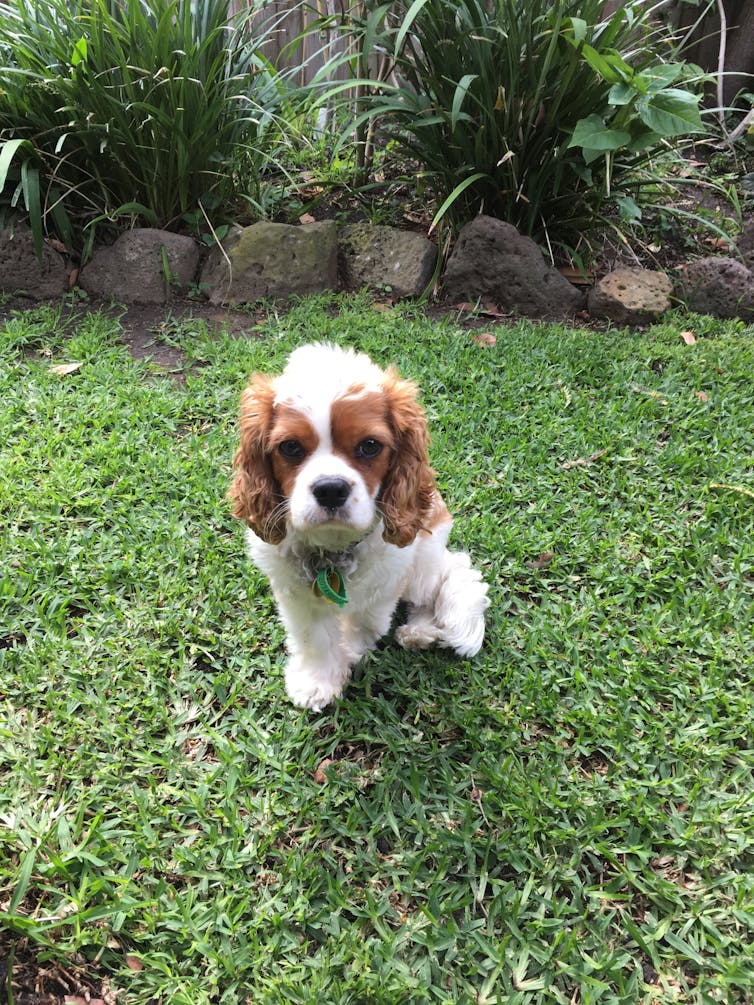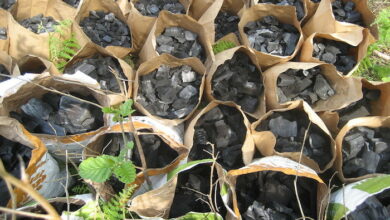
Don’t waste your dog’s poo – compost it
Australia has one of the highest rates of pet ownership in the world, with 38% of Australian households owning dogs. Dogs improve the quality of our lives, and studies show that exposure to dogs can even improve our immune system.
However, one medium sized dog produces about 180 kilograms of poo a year. With about 9 million dogs in Australia, it can really start to pile up.
Rather than wrap it in plastic and throw it away – where it eventually ends up in landfill – you can use dog poo as a sustainable source of fertiliser.

There are alternatives to simply throwing your dog poo in the bin.
Francesco83/Shutterstock
Poo problems
The waste products of humans and their associated animals have not always been a problem. In the past, even within the memory of people I met living on small Pacific islands, human poo was produced in relatively small amounts because the population was low, and could decompose naturally and safely within the soil. Healthy soil contains a vast number of microbes and organisms that thrive on organic material.
But burgeoning populations have changed this. Waste produced by humans is now an immense problem. Not only is there a waste issue, but human activities have caused soil pollution and degradation that kills soil microbes or impairs their capacity to process organic matter.
Dog poo is considered an environmental hazard. This is a consequence of its composition. It is comprised of three-quarters water plus undigested food including carbohydrates, fibre, proteins, and fats from the dog’s digestive system. Also present are a wide range of resident bacteria that are needed for digestion.
If dogs are infected with worms, or other disease-causing microbes, these can be present in their poo. Left on the street, dog poo is washed into waterways, creating a potential health hazard. Once pathogenic microbes from the poo get into waterways, they can find their way into other living things – including humans.
People also don’t like dog poo because of its smell. This is due to the volatile products produced by microbes in the gut that are involved in the digestion process. More than 100 different chemicals that could contribute to the bad smell have been identified.

Because poo smells bad we avoid dealing with it. Local councils offer plastic bags at parks and other public places to encourage dog owners to collect the poo. Bins, sometimes specifically for dog waste, are often placed nearby so the smelly package can be discarded as soon as possible.
But this is not the best solution, because ultimately the dog poo ends up going to landfill, contributing to our ongoing problem of waste accumulation.
Why dog poo can become a nutrient
Rather than becoming a pollutant, dog poo can become a nutrient for your garden, by being composted in your backyard.
If you have a garden you can make your own compost bin by adding the dog poo to grass clippings, plant or other organic waste, and even sawdust as a source of food for the microbes. The microbes then break down the organic material into humus. During this process the temperature in the compost mixture rises to 50-60℃. Over time, the heat will kill most canine bacteria, as they are adapted to live at lower temperatures in the dog’s gut.
Compost contains billions of microbes per gram of material and competition from these (as well as the environmental conditions of the compost that are very different from the dog digestive system) assist in promoting destruction of pathogenic canine microbes, if present.
The compost needs to be turned over weekly to ensure uniform composing and oxygenation. Over days or weeks the temperature in the compost drops, indicating when the decomposition process is complete.
Then it’s time to use your compost to improve your garden!
A couple of dog-do dont’s:
- Don’t include waste from unknown dogs or from dogs that show signs of disease
- Avoid using it on vegetables for human consumption.
If you live in an apartment and don’t have a garden or access to green waste, you can still compost dog poo and use the product. There are small compost bins commercially available for this purpose. Composted material from these can be used on your outdoor or indoor plants.
And if you don’t have any indoor plants, then you should think about getting some, as they can cut down on ozone in the air and even reduce indoor pollution.![]()
M. Leigh Ackland, Professor in Molecular Biosciences, Deakin University
This article is republished from The Conversation under a Creative Commons license. Read the original article.
Featured Photo by Matthew Miles on Unsplash













Thank you for an intriguing introductory article. A few basic questions remain, however. Mentioned under the heading “Dog-Do Don’ts” is (#2) “Avoid using it on vegetables for human consumption”, and (while this is definitely my instinctive reaction) this contradicts my eldest son’s recommendation. He has done more research into Permaculture than I have yet, so I’m wondering if there is a scientific or health reason to refrain from using the dog-poo compost on human food crops. If so, where would one use it, since my preference would be to replace ornamental plantings with edibles. Also, under the same heading, (#1) not to use poo from unknown dogs, what should one do with those deposits left by, say, the neighbor’s dog, or strays? Do those go into the trash for eventual inclusion in landfills? What about burning the stuff that doesn’t get composted (I imagine it needs first to be dried out)?
Dog poo, cat poo, my poo, with sawdust all goes in my compost, along with a large citrus content (at the moment) and the results are a lovely dark, sweet smelling compost I use everywhere.
I was always taught, waste is an oxymoron. On the farm or the house, there was none. When forced too rent a place with a small yard, our dogs, a black lab and dachshund, had little space to do their business. but, garden to the rescue. I dug a trench (on-going as needed) to dispose of the droppings, and bury them. Then, planted flowers to use the material. The flowers were used as mulch in the garden (a former ash dump) and next year, when pretty much anything bad was gone, used the trench for cucumbers and other things that liked very rich soil. The ash dump became a disposal site till the next year and the start of the garden cycle. A great-grandfather, a Heler (herbalist-preacher) said often that no raw manure should go into human food production as it carried diseases. He would spread it from his livestock on a field, then planted clover for a cover. In spring, it became a hay filed and the old clover field would be tilled for gardens and grains. Niio.
A very timely article.
Composting dog waste is not straight forward. It needs to be done quickly and remove any of the “ickyness” people feel about handling the faeces and also worrying about the smell. It has taken a fair amount of effort for a deisgn for a receptacle to be completed and a suitable bacteria load to be designed. Biomastered Waste Solutions has now got both available for sale so that the composting of dog (and cat waste soon) waste can be achieved in a simple manner.
For further information contact me at [email protected] and I can let you know more about aour reserach and where the units are available.
I have a vermicomposter that I use solely for dog poop. The red wigglers take approx. 21 days to turn a tub of poop into compost.
Hi, I just read your article and found it to be helpful. Thank you. I have a dog who poop everywhere she wants in our yard. So, what we do is we collect the poop and put it in the trash bin. When it comes to composting and making it a fertilizer, I think this is a good idea for our flowering plants. But I’m a bit concerned about the smell. I will try this. I followed this article too just in case someone out there might be interested https://ultimatepetnutrition.com/dog-poop/. Thanks
I have 3cats only one of which goes outside. He really likes my neighbor’s flower bed. Of course, she is upset but try telling a cat not to do something is hopeless. I tell her it is fertilizer but to no avail. Her flowers are always beautiful. Is cat poo considered fertilizer or is it damaging to the plants? I can’t do anything to stop the cat, but would like to know if it is hurting her flowers. Thank you for any help or suggestions you might have.
On the subject of smelly dog poops.
Dog’s fed raw meat and bones do not have smelly poops. That is the natural diet of the canine. My dog eats only that, his poops are quite small considering his size (40kgs) because his digestive processes are in good order. In about half an hour they have dried out and never attract flies. I put his poop under the leaf litter around my fruit trees. Great source of calcium and phosphorus and whatever else is in bones.